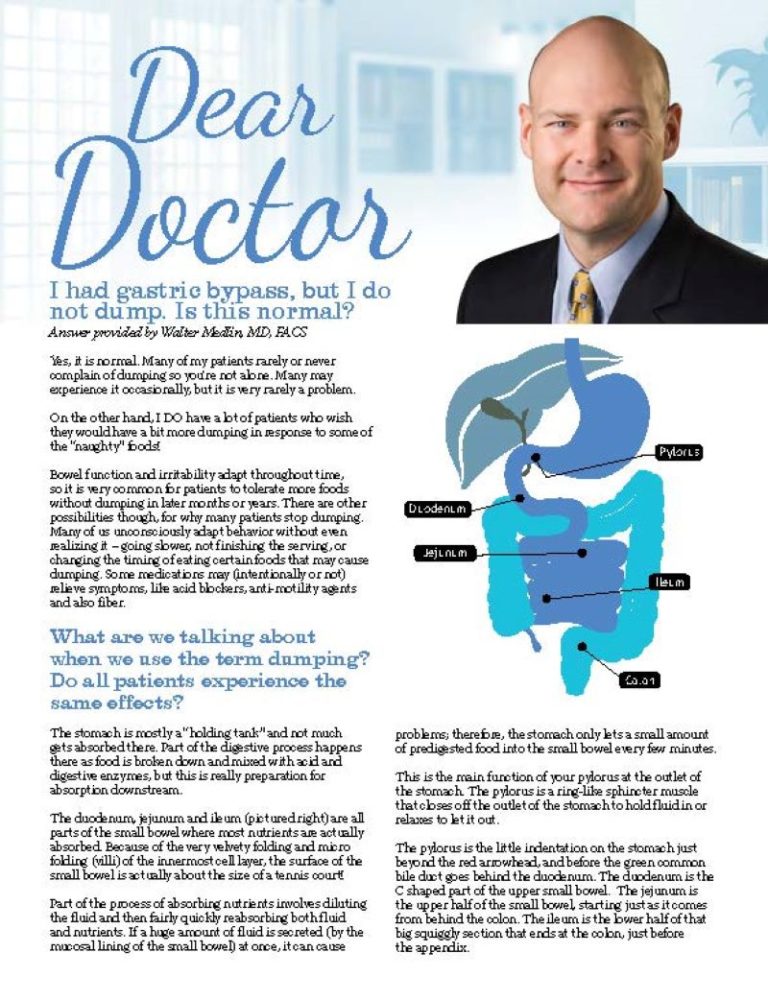Dear Doctor, I had gastric bypass, but I do not dump. Is this normal?


by Walter Medlin, MD, FACS
Spring 2014
Yes, it is normal. Many of my patients rarely or never complain of dumping so you’re not alone. Many may experience it occasionally, but it is very rarely a problem. On the other hand, I DO have a lot of patients who wish they would have a bit more dumping in response to some of the “naughty” foods!
Bowel function and irritability adapt throughout time, so it is very common for patients to tolerate more foods without dumping in later months or years. There are other possibilities though, for why many patients stop dumping. Many of us unconsciously adapt behavior without even realizing it – going slower, not finishing the serving, or changing the timing of eating certain foods that may cause dumping. Some medications may (intentionally or not) relieve symptoms, like acid blockers, anti-motility agents and also fiber.
What are we talking about when we use the term dumping? Do all patients experience the same effects?
The stomach is mostly a “holding tank” and not much gets absorbed there. Part of the digestive process happens there as food is broken down and mixed with acid and digestive enzymes, but this is really preparation for absorption downstream.
The duodenum, jejunum and ileum (pictured right) are all parts of the small bowel where most nutrients are actually absorbed. Because of the very velvety folding and micro folding (villi) of the innermost cell layer, the surface of the small bowel is actually about the size of a tennis court!
Part of the process of absorbing nutrients involves diluting the fluid and then fairly quickly reabsorbing both fluid and nutrients. If a huge amount of fluid is secreted (by the mucosal lining of the small bowel) at once, it can cause problems; therefore, the stomach only lets a small amount of predigested food into the small bowel every few minutes.
This is the main function of your pylorus at the outlet of the stomach. The pylorus is a ring-like sphincter muscle that closes off the outlet of the stomach to hold fluid in or relaxes to let it out.
The pylorus is the little indentation on the stomach just beyond the red arrowhead, and before the green common bile duct goes behind the duodenum. The duodenum is the C shaped part of the upper small bowel. The jejunum is the upper half of the small bowel, starting just as it comes from behind the colon. The ileum is the lower half of that big squiggly section that ends at the colon, just before the appendix.
If a larger than usual amount of mixed and broken down food is released (dumped) from the stomach, the system can be overwhelmed. Below, this is a simple description of what occurs when you dump:
- The secretion of a large volume of fluid into your bowel has to come from somewhere, and that decreases the circulating plasma volume in your blood. This may cause your blood pressure to drop and increase your heart rate. As our body responds to this change we feel sweaty, lightheaded, with pounding heart and sometimes anxiety.
- All that fluid in the small bowel creates stretching which is painful. Hyperactive squeezing (peristalsis) causes cramping sensation.
- If your nutrient load gets absorbed more rapidly than usual, then blood sugar levels climb more rapidly than the system can respond.
- As our body reacts to this spike in blood sugar level, insulin is secreted more rapidly than usual – trying to force sugar to be absorbed into the tissues that normally either use or store glucose (muscle, fat, liver cells). But high insulin can overshoot, and then rebound low blood sugar (hypoglycemia) occurs making you feel even more lightheaded, weak, foggy. Maybe even like you may pass out.
That all happened in 10 to 30 minutes. An hour later, if all this fluid reaches the large bowel (colon) fast enough, the colon now may be overwhelmed in its ability to reabsorb that water and form solid stool. This fluid then reaches the rectum as liquid diarrhea, the main feature of late dumping.
Causes of Dumping
The most common cause of occasional dumping is a fast ingestion of highly concentrated sugar-containing liquid or soft food. This includes juices, alcohol drinks, fruit or yogurt smoothies, and of course ice cream or milkshakes. Be cautious of the well-meaning emergency room giving you a slug of orange juice for your hypoglycemia!
Most patients can take either a smaller amount of these foods or go more slowly and avoid the dumping symptoms. Gastric sleeve patients are not immune, but it is much less common and usually takes a larger amount or faster intake.
Conclusion
Some imaging tests can show fast gastric emptying that may correspond to symptoms of dumping, but the symptoms are as important as the studies. Other problems that can be confused with dumping include ulcer, gallbladder problems, bowel obstruction, intussusception, or hernia. Most commonly though – is simply eating too fast with packing and spasm of the pouch. Sometimes people have a sensation of plugging, excessive salivation (“sliming”) and then vomiting.
If you feel that you are experiencing dumping too often, and it’s impacting your quality of health and life, contact your bariatric surgeon and let them know your symptoms. It’s always good to keep your bariatric team in the loop.
About the Author:
Walter Medlin, MD, FACS, is a bariatric surgeon and sleeve gastrectomy patient now five years post-op. He tweets @bonuslife, and rarely takes a third gulp of a milkshake! He hopes to see you all at the YWM2014 Convention in Orlando, Fla.
by OAC Staff Members Kendall Griffey and Michelle “Shelly” Vicari Winter 2024 In a world that often…
Read Articleby Rachel Engelhart, RD; Kelly Donahue, PhD; and Renu Mansukhani, MD Summer 2023 Welcome to the first…
Read ArticlePost-operative addiction is often overly simplified as transfer addiction or cross-addiction, assuming individuals “trade” compulsive eating for…
View Video










